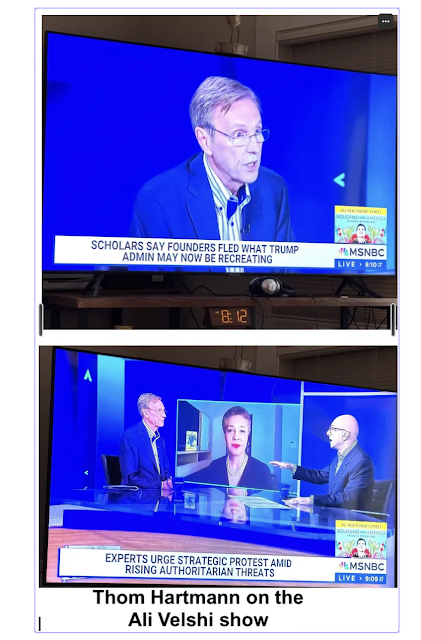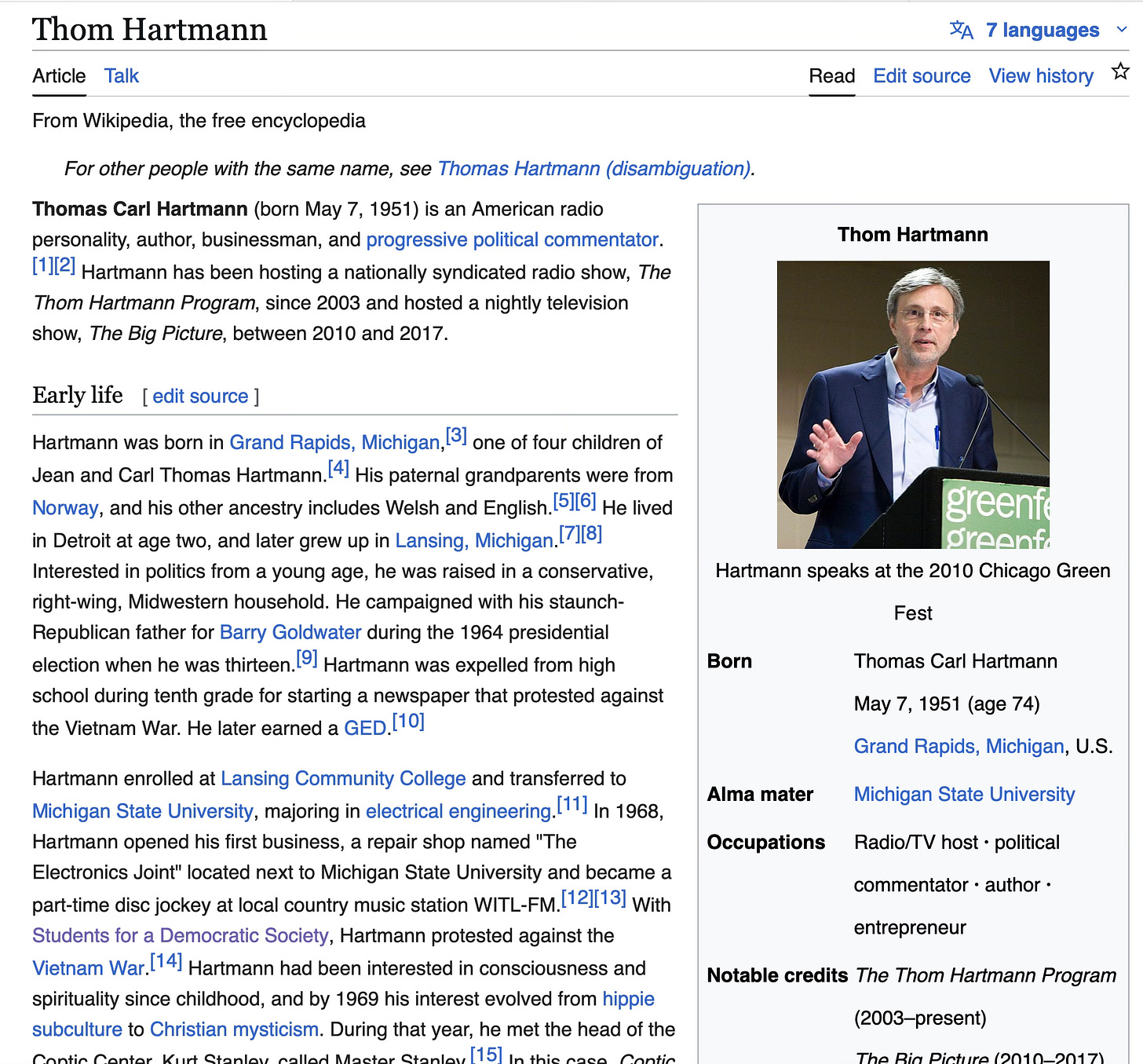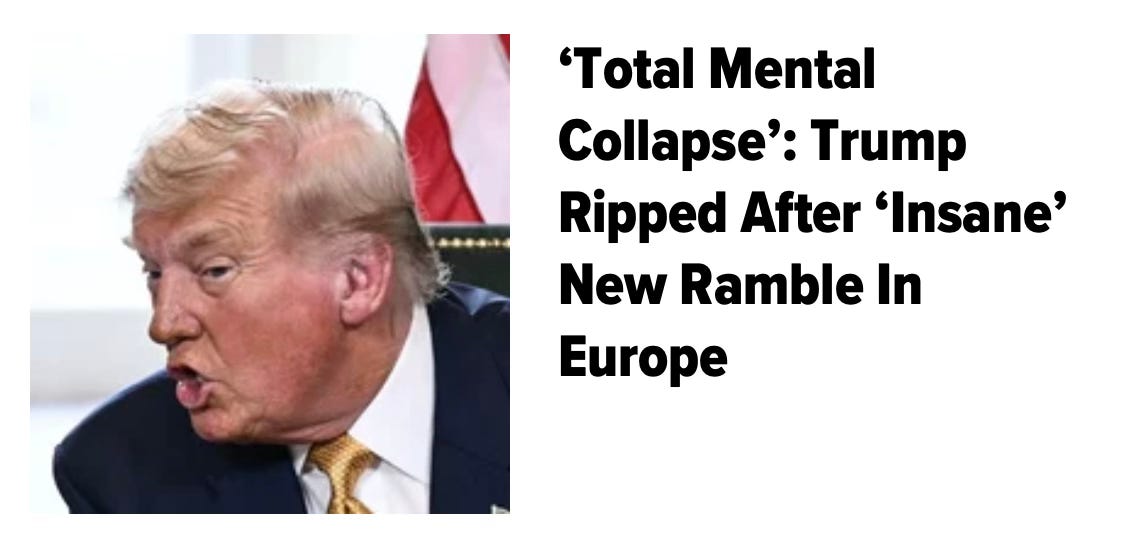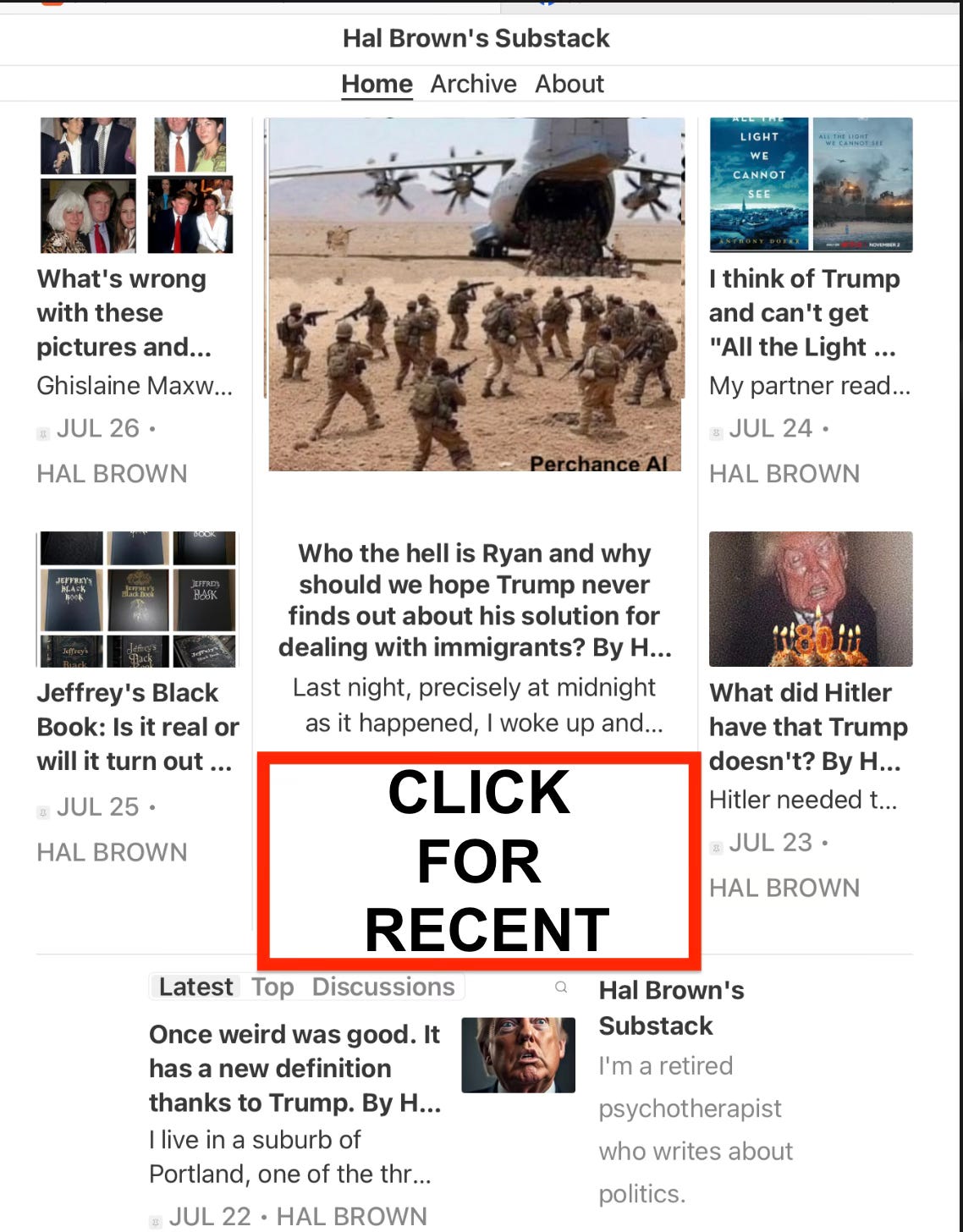If you’ve never heard of Thom Hartmann, here’s his Wikipedia profile.
I spent so much time writing a comment on Thom Hartmann’s Substack this morning that I never came up with a topic to write about. There are so many things about Trump I could write about. However I have nothing new to say. Certainly his outrageous behavior in Scotland is being discussed in the liberal media.
As a therapist I’d be inclined to write about this story:
Then, really what could I say about how unhinged Trump is that isn’t it obvious?
This is why I am taking the lazy way out and using what I wrote earlier as my Substack.
I didn’t react to everything Hartmann wrote in his Substack, “This Is Not a Drill: Infiltrate Your Local Dems Before It’s Too Late.”
This is what I wrote:
I saw you on Ali Velshi and was glad to see you mention E.Lansing and SDS (when my partner and I had lunch with you we talked about our both being at Michigan State and involved in the anti-Vietnam War protests in different ways at the time). I knew several SDS activists but wasn't a member at the time. I was in Social Work grad school and ended up as the leader of our protests. We were the second department to go on strike (after the Psychology Dept) following the Kent State massacre. Nursing was the third, thus all of Baker Hall had departments close so we put an "on strike" banner on the building. I had the heady experiencing of announcing our demands (along with other student leaders) to an overflow audience in the jam packed auditorium. We never met but were in the very same march to the state capitol building.
By the way, my partner is still in touch with the woman who came from Chicago with her husband to visit you and your team. I expect she is reading this.
As I refect back on those protest days and think about the protests against Trump and his dictatorship I am heartened in some ways and frightened in another.
What inspires me is that the student protests were a major factor (along with the U.S. losing) that led to the country getting out of Vietnam. While at the time we had high hopes we'd make a difference we didn't know that we would. However, LBJ wasn't a dictator. When the National Guard opened fire on students at Kent State the outrage resonated across the country and LBJ cared about this. He responded to public opinion.
Currently we have the closest thing to a dictator in American history. Now we have Trump's Gestapo thugs going after immigrants. The outrage coming from the liberal media and, to varying degrees, the public is like water off a duck's back for Trump, Homan, Bondi, Miller and his Hitlerian psychopaths. Trump not only doesn't care, but as a paradigm of someone in the Dark Tetrad (the Dark Triad plus sadism) he feels good about being able to terrify and hurt his enemies.
While Trump's Gestapo hasn't gunned down anybody, at least not yet, yesterday I went into what I hope was hyperbole mode about the chance Trump would deport his victims to a country where they could be killed. They'd be dropped off in a desert in a host country like South Sudan that Trump would pay big money to, and then it would be out of sight and out of mind as far anyone knew. Their fate would never be known.
There are people like a guy who said his name was Ryan who called in to a CSPAN show who support the shooting of immigrants. Trump has expressed fantasies of alligators in the Rio Grande and shooting people trying to cross in the legs. We have a sadistic president and sadists who support him. Now alligators come up again in his Alligator Alcatraz where his fantasy is them eating people who try to escape.
I agree that Democrats have to get their act together. But I despair that even if they do and take back both houses of Congress and win state and local races we may not even have a "next election" because Trump will have cemented his dictatorship and been able to establish total control. When I think of this happening, I don't think engaging in tradtional politics (and protests) can save us. The only hope I have is that if Trump comes close to pulling this off, declares martial law, and activates the armed forces against citizens, is that the true patriots in the military will effect a coup to depose him.
Update:
There was one reply to my comment on Hartmann’s Sunstack:
Hal, I am aware that those who protested that war like to pat themselves on the back for ending it, but in reality the protests evoked a reaction, reverse psychology, among middle America and they demanded victory and f...k them damned commie hippies.
What finally did the job Hal, is middle America watching aluminum coffins being unloaded , the daily body count and the 58,000 military funerals of their sons, brothers, uncles and cousins.
Middle America tired of the war Hal that is why it ended.
Middle Russia would tire of that war also, had they freedom of press and freedom of speech, and not the threat of prison or falling out of windows.
This is was answer:
I don't see this as "a pat on the back" as if I want to glorify what we did. You are correct that there was pro-war blowback and that it coincided with the Hippie Era (sometime called the counter-culture) didn't help our cause. In fact, however some of us looked like Hippies (Thom with long hair, for example), but we weren't. I don't think so-called Hippies were a major part of the anti-war campus movement, nor were the Yippies ( https://en.wikipedia.org/wiki/Youth_International_Party ) for that matter. It wasn't even SDS. It was ordinary middle class students that comprised the majority of the movement.
I don't think the impact of the student protests should be minimized. We did have an impact on the eventual end, but so did everything you say.
The looming threat of the draft was another reason people turned against the war. Those of draft age and their parents didn't wanrt anything to do with a war which had nothing to do with saving democracy in America. The growing death count couldn't be hidden.
Any history of how and the war ended must include what Walter Cronkite said and LBJ's reaction to losing his support. ( https://mediamythalert.com/2009/12/06/cronkite-moment-what-johnson-supposedly-said/ )
It also wasn't the protesting students but also how they impacted their families. Pro-war parents in many cases had to have been educated by their children.
By the way, Michigan State was one of the universities described in "Campus Wars: The Peace Movement At American State Universities in the Vietnam Era " ( https://www.amazon.com/Campus-Wars-Movement-American-Universities/dp/0814735126 )
From Amazon:
"At the same time that the dangerous war was being fought in the jungles of Vietnam, Campus Wars were being fought in the United States by antiwar protesters. Kenneth J. Heineman found that the campus peace campaign was first spurred at state universities rather than at the big-name colleges. His useful book examines the outside forces, like military contracts and local communities, that led to antiwar protests on campus."
—Herbert Mitgang, The New York Times
"Shedding light on the drastic change in the social and cultural roles of campus life, Campus Wars looks at the way in which the campus peace campaign took hold and became a national movement."
—History Today
"Heineman's prodigious research in a variety of sources allows him to deal with matters of class, gender, and religion, as well as ideology. He convincingly demonstrates that, just as state universities represented the heartland of America, so their student protest movements illustrated the real depth of the anguish over US involvement in Vietnam. Highly recommended."
—Choice
"Represents an enormous amount of labor and fills many gaps in our knowledge of the anti-war movement and the student left."
—Irwin Unger, author of These United States
The 1960s left us with some striking images of American universities: Berkeley activists orating about free speech atop a surrounded police car; Harvard SDSers waylaying then-Secretary of Defense Robert McNamara; Columbia student radicals occupying campus buildings; and black militant Cornell students brandishing rifles, to name just a few. Tellingly, the most powerful and notorious image of campus protest is that of a teenage runaway, arms outstretched in anguish, kneeling beside the bloodied corpse of Jeff Miller at Kent State University.While much attention has been paid to the role of elite schools in fomenting student radicalism, it was actually at state institutions, such as Kent State, Michigan State, SUNY, and Penn State, where anti-Vietnam war protest blossomed. Kenneth Heineman has pored over dozens of student newspapers, government documents, and personal archives, interviewed scores of activists, and attended activist reunions in an effort to recreate the origins of this historic movement. In Campus Wars, he presents his findings, examining the involvement of state universities in military research — and the attitudes of students, faculty, clergy, and administrators thereto — and the manner in which the campus peace campaign took hold and spread to become a national movement.
Recreating watershed moments in dramatic narrative fashion, this engaging book is both a revisionist history and an important addition to the chronicle of the Vietnam War era.









No comments:
Post a Comment